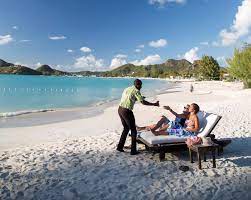By Ernest Amadoe
In the aftermath of the global upheaval brought about by the COVID-19 pandemic, many island states have found themselves with a serious challenge in trying to meet their Sustainable Development Goals (SDGs), goals like quality education, decent work and economic growth, poverty eradication, climate action and the development of industry, innovation and infrastructure to name a few.
However the resurgence of the tourism sector in many of these islands has demonstrated what a powerful partner our tourism stakeholders are and can be to sustainable development, and it is a partnership regional governments should hasten to solidify.
It is no secret that the Caribbean region is more dependent on tourism than maybe any other region of the world, however that is not something to run from – in truth it is something that can be built upon. Pre-pandemic the tourism industry contributed 10.3% of the global GDP, and despite the effects of COVID, the industry rebounded to contribute US$5.81 trillion to global GDP in 2021. In spite of what some may see as vulnerabilities, travel and tourism has also demonstrated its resilience, and has already surpassed many other sectors in terms of recovery and growth.
It is noteworthy that many of the countries that worked closely with their tourism stakeholders and were proactive in reopening their borders are now reaping the fruits of their actions. Speaking at a Caribbean Tourism Organisation event in September Saint Lucia’s Deputy Prime Minister and Minister of Tourism Dr. Ernest Hilaire declared that his country’s tourism sector was soaring. It was also heartening to see that Grenada’s new Tourism Minister Lennox Andrews commit to deepening the linkages between tourism stakeholders and the wider population.
Minister Andrews said his goal is to make sure that his government and the people of Grenada understand that all sectors are linked to tourism, “We have to find a way to bring the good news as far as tourism is concerned to the common man. So, the man who sells the beads or the bangles by the roadside, he must understand that that too is tourism; the man that is in his farm and grows tomatoes and pumpkins, he must understand that that too is tourism; the taxi driver that is on the road, he must understand that that too is tourism. Once we can establish that linkage and bring that knowledge to our population, then the value of the industry can be seen.”
One stakeholder that has consistently demonstrated its commitment to deepening tourism linkages, and therefore driving sustainable growth and development in the Caribbean has been Sandals Resort International, by far and large the biggest player in the regional market and also the largest employer. Sandals also happens to be a Caribbean born company – so there could be no more ready-made partner for regional governments to work with. In fact Sandals has been on the front foot despite the pandemic and has announced ambitious plans to deepen its investment in several islands with new hotels and expansion projects. That is already in line with several of the SDGs including increasing employment, driving economic activity, creating new infrastructure and driving innovation through training and the transfer of skills.
Even beyond that Sandals Executive Chairman Adam Stewart – who chairs the Linkages Council in Jamaica – has been championing the benefits tourism has for all sectors. In Jamaica for instance, over 90% of the produce consumed by Sandals Resorts comes from local suppliers. In fact, speaking at a global tourism event in New York recently, Stewart suggested that the challenges with the international supply chain presents enormous opportunities to build bridges with local suppliers of goods and products and the tourism sector.
He noted, “We (Sandals) have spent a long time working in and around supply chains, so farmers, fishers, local manufacturers, transportation, just the whole ecosystem of tourism and trying to amplify it in our Caribbean islands.” Stewart recalled a recent initiative where Sandals bought seeds for farmers, put them in business and then gave them fixed contracts to supply the hotel chain. Those are the kind of synergies that are required, and there is no more potent driving force to help boost sustainable development than our tourism partners.
Stewart also noted the investment being made in training and developing human capital by Sandals, from the internal Sandals Corporate University, to the point where Sandals has now partnered with the University of the West Indies and Florida International University and will be building the Gordon ‘Butch’ Stewart School of Hospitality and Tourism in Montego Bay, Jamaica – again in direct alignment with the Sustainable Development Goals of the region.
It is a conversation that regional governments need to jump on as soon as possible, because tourism is our competitive advantage – not a disadvantage …but there is work to be done.
President of the Caribbean Hotel and Tourism Association Nicola Madden-Greig – who has been championing the deepening of cooperation between tourism stakeholders and regional governments – says there are some issues that need to be addressed immediately which include high taxes and fees and cumbersome entry requirements. The fact is that despite tourism’s robust recovery, the sector still faces numerous challenges such as labour shortages, escalating costs and restrictive policies. Creating a favourable and enabling environment in which tourism stakeholders can thrive and grow, will ultimately result in huge benefits for everyone, including regional economies and societies.
Which brings me back to the main point of this discussion; that as we try to set our islands on a path to positive growth and sustainable development, we need to capitalise on the superpower of the Caribbean, which is tourism, and we need to proactively pursue aligning our SDGs with the benefits that come from this key sector.




